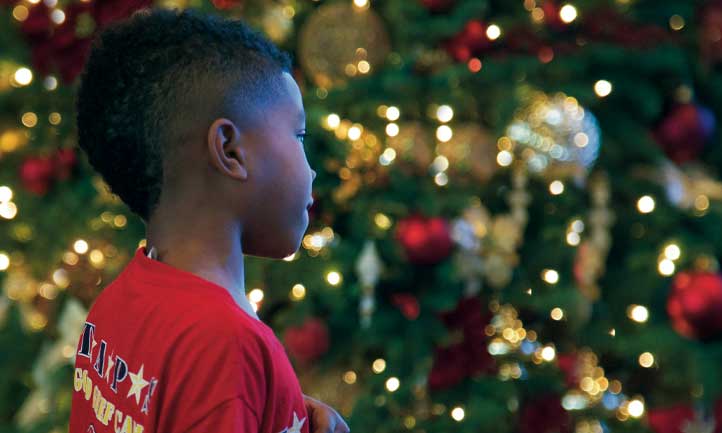3 C’s for Holiday Grief
Author: Kenneth Doka
For those who are grieving, the holidays can be unfamiliar terrain. Whether you celebrate Christmas, Hanukkah or Kwanzaa, this time is filled with fond remembrances of loved ones who are on your mind yet absent from your traditions and rituals. Acknowledging the difficulties of holidays after loss does not make a potentially difficult time any easier, but preparing for the holidays by tapping into helpful coping strategies may provide some much-needed help.
 Photo: TAPS Archives, Karen Kohlberg
Photo: TAPS Archives, Karen Kohlberg
Even with our world largely virtual during the pandemic, you can still apply these 3 C’s recommended by grief expert Ken Doka, PhD, to help navigate your way through the holidays.
Choose
During the holidays, it’s easy to drift into activities that have the potential to increase your pain. You have choices. Decide what you want to be part of, who you want to be with, and what you want to do. After her husband died, June was invited— and felt pressured—to join her sister-in-law for Hanukkah celebrations. She decided that she would retain the freedom to choose where she wanted to be until that morning. “I never know how much energy I’ll have or how I’ll feel until that day,” she explained. She decided to eat dinner with a few women she knew through a widow’s support group. She chose to go to her sister-in-law’s house for dessert.
You may also want to consider how to mark your loss during the holidays. During the holidays you may feel the presence of that person’s absence. Finding ways to recognize and acknowledge that individual can bring a positive focus to your grief. This may be done in a number of ways. Lighting a candle, creating a ritual, placing a memento on a tree, holding a moment of silence or a holiday toast are simple ways to acknowledge the losses felt so keenly this time of year.
Communicate
Discussing your choices with others, especially those affected by them, is important. They have needs as well. Their ways of dealing with grief may be different. June, for example, talked with her sister-in-law, explained her feelings and asked if she could make a decision that day. Once her sister-in-law understood June’s feelings and needs, she understood June’s need for flexibility. Traditions may come into play because they involve choices. Communication about them is important. The Smith family, for example, had a long discussion about how to handle the Christmas tree following the death of one of their children.
Compromise
Each person deals with loss in his or her own particular way and therefore has different needs. There is no right or wrong way to grieve. Leaving space for compromise is important. For example, some people in the Smith family saw the Christmas tree as an important tribute to their late son and brother. Other family members felt it was disrespectful. They talked through each point of view, and decided to have a small tree—not in the central living room, but in the family room. Those who wanted to help decorate could, but those who chose not to would also be respected.
Nothing changes the fact that the holidays can be especially difficult while grieving. But if you choose your actions, communicate your choices to others, and find suitable compromises, you may find that they become bearable and that you have renewed strength and hope.
© Hospice Foundation of America. Reprinted with permission from Journeys with Grief: A Collection of Articles about Love, Life and Loss; edited by Kenneth J. Doka, PhD, MDiv. For information or ordering, visit the Hospice Foundation of America website.
